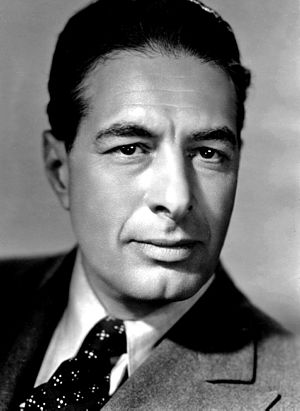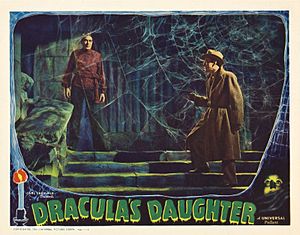Irving Pichel facts for kids
Quick facts for kids
Irving Pichel
|
|
|---|---|

Pichel in the 1940s
|
|
| Born |
Irving Pichel
June 24, 1891 Pittsburgh, Pennsylvania, U.S.
|
| Died | July 13, 1954 (aged 63) Hollywood, California, U.S.
|
| Resting place | Mountain View Cemetery, Oakland, Alameda County, California, U.S. |
| Occupation |
|
| Years active | 1920–1954 |
| Spouse(s) | Violette Wilson |
| Children | 3 |
Irving Pichel (June 24, 1891 – July 13, 1954) was an American actor and film director. He was well-known for his work in Hollywood, both in front of and behind the camera.
Contents
Early Life and Career
Irving Pichel was born into a Jewish family in Pittsburgh, Pennsylvania. He went to Pittsburgh Central High School. After high school, he studied at Harvard University and graduated in 1914. Right after college, he started working in theater.
Pichel's first job in musical theater was as a technical director for the San Francisco Bohemian Club. He also helped with their yearly summer show. In 1923, he started the Berkeley Playhouse and was its director until 1926.
Becoming an Actor
Pichel moved to Los Angeles to study acting at the Pasadena Playhouse. He became very famous there for playing the main character in the play Lazarus Laughed in 1927.
Just two years later, film studios were looking for actors who had theater training. This was because movies were starting to have sound, and actors needed to be able to speak clearly. Pichel signed a contract with Paramount Pictures.
Throughout the 1930s, Pichel worked steadily as a "character actor." This means he often played interesting supporting roles instead of the main hero. Some of his notable films include An American Tragedy (1931), Madame Butterfly (1932), and Oliver Twist (1933), where he played the character Fagin. He also appeared in Cleopatra (1934) and Dracula’s Daughter (1936).
Besides acting in films, Pichel also performed on the radio. He sometimes had small, uncredited parts in movies he directed. He was also the narrator for two John Ford films: How Green Was My Valley (1941) and the Western She Wore a Yellow Ribbon (1949).
Directing Films
Pichel became friends with screenwriter George S. Kaufman. He soon became interested in directing films. After 1939, he acted less and focused more on directing. He started by co-directing some smaller films. Then, in 1939, he signed with 20th Century Fox and began directing movies with famous stars.
Many of his early directing jobs were on films that spoke out against the Nazis and supported Great Britain. These were made before the United States joined World War II. For example, The Man I Married (1940) was about an American wife who discovers her German husband is a Nazi. It even included real news footage from 1938 showing the rise of Nazism. Another film, Hudson’s Bay (1941), was a historical adventure about the British founding of Canada.
The Pied Piper (1942) told the story of an old Englishman trying to help five children escape from Nazi-occupied France. The film was highly praised and was even nominated for an Oscar for Best Picture. Critics said Pichel did a great job of showing the horrors of war through hints rather than graphic scenes.
Pichel also directed The Moon Is Down (1943), which was based on a novel by John Steinbeck. The story was about how a small Norwegian village organized resistance against Nazi invaders. This film helped inspire people in Europe to resist the Nazi occupation. It also featured the first movie appearance of Natalie Wood as a child actress, whom Pichel discovered.
He also directed Alan Ladd in O.S.S. (1944). This movie was about the Office of Strategic Services (O.S.S.), which was an early version of the Central Intelligence Agency. It was one of the first films to show the work of the O.S.S.
More war-themed films followed, like A Medal for Benny (1945) and Tomorrow Is Forever (1946). In Tomorrow Is Forever, Natalie Wood had her first credited role. Pichel also directed Mr. Peabody and the Mermaid (1948), a fantasy film about a man who catches a mermaid.
Pichel also directed Quicksand (1950), a low-budget film noir. It featured a strong performance from Mickey Rooney.
One of Pichel's most famous films was the science fiction movie Destination Moon (1950). This film was a pioneer in showing space travel in a realistic way. It won an Oscar for Special Visual Effects. It also won an award at the 1st Berlin International Film Festival. Pichel worked with science fiction writer Robert A. Heinlein and artist Chesley Bonestell to make the film scientifically accurate.
Pichel's last Hollywood film was the Western Santa Fe (1951). His career in Hollywood slowed down due to the "blacklist" (explained below). His final films were made in Europe. These included Martin Luther (1953), a film about the life of the religious reformer, and Day of Triumph (1954), about the life of Christ. Martin Luther was nominated for two Oscars and was named one of the top ten films of the year by the National Board of Review.
Irving Pichel died one week after Day of Triumph was finished.
The Hollywood Blacklist
In 1947, Irving Pichel was one of 19 people from Hollywood who were called to appear before the House Un-American Activities Committee (HUAC). This committee was investigating people they thought might have ties to communism during a time called the "Red Scare." This group became known as the "Hollywood Nineteen" because they refused to name people they suspected of being communists.
Even though it was not clear if Pichel had ever been a communist, the committee thought he might have had communist sympathies. This was partly because he had directed the anti-Nazi film The Man I Married (1940). This was sometimes called "premature antifascism" by the committee.
Pichel was eventually cleared, meaning he was not found guilty. However, he was still put on the Hollywood blacklist. This meant that studios would not hire him to work on films in the United States. This forced him to leave the country to direct his last movies.
Personal Life
Irving Pichel married Violette Wilson. Her father, Jackson Stitt Wilson, was a Methodist minister and a Socialist mayor of Berkeley, California. Violette's sister was the actress Viola Barry. Irving and Violette had three sons: Julian Irving Pichel, Marlowe Agnew Pichel, and Pichel Wilson Pichel.
Awards and Recognition
In 2001, 50 years after its release, Destination Moon received a special 1951 Hugo Award for Best Dramatic Presentation. This award was given retroactively for being an important science fiction film from 1950. The film was also nominated for AFI's list of Top 10 Science Fiction Films.
The film Martin Luther was re-released on DVD for its 50th anniversary.
Filmography
Actor
- The Right to Love (1930) as Caleb Evans (film debut)
- Murder by the Clock (1931) as Philip Endicott
- An American Tragedy (1931) as District Attorney Orville Mason
- The Road to Reno (1931) as Robert Millet
- The Cheat (1931) as Hardy Livingstone
- Two Kinds of Women (1932) as Senator Krull
- The Miracle Man (1932) as Henry Holmes
- Forgotten Commandments (1932) as Prof. Marinoff
- Westward Passage (1932) as Harry Ottendorf
- The Painted Woman (1932) as Robert Dunn, Lawyer
- Strange Justice (1932) as Waters
- Wild Girl (1932) as Rufe Waters
- Madame Butterfly (1932) as Yomadori
- The Billion Dollar Scandal (1933) as Albert Griswold
- The Mysterious Rider (1933) as Cliff Harkness
- The Woman Accused (1933) as District Attorney Clark
- Oliver Twist (1933) as Fagin
- King of the Jungle (1933) as Corey
- The Story of Temple Drake (1933) as Lee Goodwin
- I'm No Angel (1933) as Bob – Clayton's Attorney (uncredited)
- The Right to Romance (1933) as Dr. Beck
- Fog Over Frisco (1934) as Jake Bello
- Return of the Terror (1934) as Daniel Burke
- British Agent (1934) as Sergei Pavlov
- Cleopatra (1934) as Apollodorus
- I Am a Thief (1934) as Count Trentini
- The Silver Streak (1934) as Captain Herman Bronte
- Special Agent (1935) as U.S. District Attorney
- Three Kids and a Queen (1935) as Kraft
- Don't Gamble with Love (1936) as Rick Collins
- The House of a Thousand Candles (1936) as Anton Sebastian
- Special Agent K-7 (1936) as Lester Owens
- Dracula's Daughter (1936) as Sandor
- Hearts in Bondage (1936) as Secretary of War Sumner Gideon Welles
- Down to the Sea (1936) as Alex Fotakis
- General Spanky (1936) as Simmons
- Join the Marines (1937) as Colonel Leonard
- High, Wide, and Handsome (1937) as Mr. Stark
- The Sheik Steps Out (1937)
- Jezebel (1938) as Huger
- There Goes My Heart (1938) as Mr. Gorman
- Newsboys' Home (1938) as Tom Davenport
- Topper Takes a Trip (1938) as Prosecutor
- Juarez (1939) as Gen. Carbajal
- Exile Express (1939) as Victor
- Dick Tracy's G-Men (1939) as Nicolas Zarnoff
- Rio (1939) as Rocco
- The Great Commandment (1939) as Jesus Christ (voice, uncredited)
- Torture Ship (1939) as Dr. Herbert Stander
- How Green Was My Valley (1941) as adult Huw Morgan (the unseen narrator)
- The Moon Is Down (1943) as Peder, Inn Keeper (uncredited)
- December 7th (1943) as Narrator (voice, uncredited)
- Tomorrow Is Forever (1946) as Radio Commentator (voice, uncredited)
- The Bride Wore Boots (1946) as Steeplechase Announcer (uncredited)
- They Won't Believe Me (1947) as Courtroom Extra (uncredited)
- Something in the Wind (1947) as Dynamo Dan (voice, uncredited)
- She Wore a Yellow Ribbon (1949) as Narrator (voice, uncredited)
- The Great Rupert (1950) as Puzzled Pedestrian (uncredited)
- Quicksand (1950) as Radio Announcer (voice, uncredited)
- Destination Moon (1950) as Off Screen Narrator of Woody Woodpecker Cartoon (uncredited)
- Santa Fe (1951) as Harned
- Martin Luther (1953) as Brueck
Director
- The Most Dangerous Game (1932) (directorial debut)
- Before Dawn (1933)
- She (1935)
- The Gentleman from Louisiana (1936)
- The Duke Comes Back (1937)
- The Sheik Steps Out (1937)
- Beware of Ladies (1937)
- Larceny on the Air (1937)
- The Great Commandment (1939)
- Earthbound (1940)
- The Man I Married (1940)
- Hudson's Bay (1941)
- Dance Hall (1941)
- Secret Agent of Japan (1942)
- The Pied Piper (1942)
- Life Begins at Eight-Thirty (1942)
- The Moon Is Down (1943)
- Happy Land (1943)
- And Now Tomorrow (1944)
- A Medal for Benny (1945)
- Colonel Effingham's Raid (1946)
- Tomorrow Is Forever (1946)
- The Bride Wore Boots (1946)
- O.S.S. (1946)
- Temptation (1946)
- They Won't Believe Me (1947)
- Something in the Wind (1947)
- The Miracle of the Bells (1948)
- Mr. Peabody and the Mermaid (1948)
- Without Honor (1949)
- The Great Rupert (1950)
- Quicksand (1950)
- Destination Moon (1950)
- Santa Fe (1951)
- Martin Luther (1953)
- Day of Triumph (1954) (final film)
See also
 In Spanish: Irving Pichel para niños
In Spanish: Irving Pichel para niños
 | Bayard Rustin |
 | Jeannette Carter |
 | Jeremiah A. Brown |


